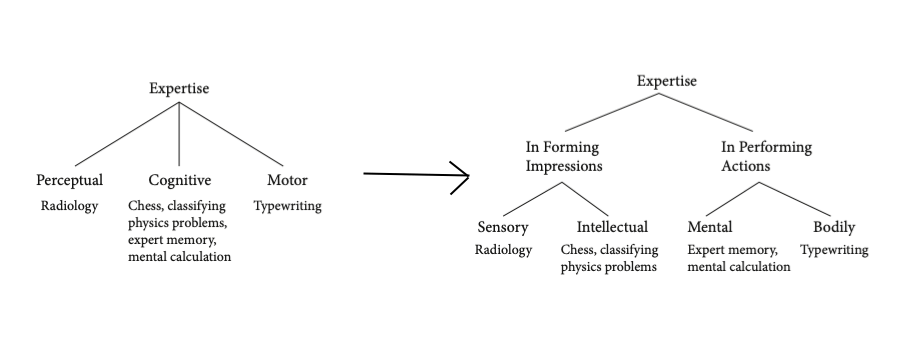Introduction

The book divides into three parts.
I’ll conclude this post by saying a bit about how I see the structural differences between expertise in forming impressions and expertise in performing actions. In the next post I’ll focus on the former and talk about the differences between sensory impressions and intellectual impressions.
Radiologists can reliably tell whether a seen x-ray image is abnormal without scanning its details. This is an example of expert perception.
These are some of the questions pursued in my recently published book, Forming Impressions: Expertise in Perception and Intuition (OUP, 2020). I will blog about it in a series of posts this week. I’m grateful for the opportunity and owe special thanks to Nick Byrd for extending the invitation.
Nothing in what I argue requires us to stop using the categories of perceptual, cognitive, and motor expertise. We need only recognize that cognitive expertise is disunified: it includes expertise in forming intellectual impressions and expertise in performing mental actions.
Let’s say that expertise in a domain is the capacity for appropriately superior performance in that domain. Researchers on expertise routinely classify its forms into one of three categories: perceptual, cognitive, and motor. I’m using the term “expert impression” to pick out a category that includes both expert perception and expert intuition. Where do expert impressions fit in the classification?
Locating Expert Impressions
Part 1. Characterizing Expert Impressions
Part 2. The Epistemology of Expert Impressions
Part 3. Expert Impressions in Philosophy
Experts in physics immediately judge problems to be similar or different according to the laws governing their solution (F = MA), rather than their surface structure (inclined plane).
Expert calculators quickly solve multi-digit multiplication problems by decomposing them into tasks they easily perform with specialized algorithms and a store of arithmetical facts.
Expertise in performing actions in a domain, on the other hand, is a capacity for performing superior actions in that domain that is grounded in domain-related planning strategies. When you plan an action you (1) represent a goal to be achieved, (2) compose a list of tasks whose execution will achieve that goal, and (3) execute the tasks on that list. Expert typists, for example, anticipate upcoming typing goals by looking ahead and plan the movements of their fingers so that the movements at one time facilitate and do not disrupt the movements that will be required later. Planning can be updated in light of feedback from performance, and it is useful to think of execution as a phase of planned action rather than something separate.
There is a similarity between grouping physics problems and detecting lesions in x-ray images. Both are impressions of patterns. One is an intellectual impression and the other is a sensory impression, but I think it is important to highlight the common root. There is also a similarity between doing multi-digit multiplication in one’s head and expert typewriting. Both are complex actions that require selecting and executing the right procedures. One is a mental action and the other is a bodily action, but again, I think it is important to highlight the common root.
And now I can easily point to expert impressions. They are clearly labeled on the second tree. The two labeled varieties correspond to expert perceptions and expert intuitions: expert sensory impressions are just the same as expert perceptions, and expert intellectual impressions are just the same as expert intuitions. They should be treated together because of their common root.
Chess masters immediately think of superior moves, so that the move they ultimately choose differs from these initial options only in difficult cases. This is an example of expert intuition.
The key difference between expert impressions and expert actions is the difference between improved searching and improved planning.
Expert Impressions and Expert Actions
The answer is that they do not fit and that this is because the three-fold system of classifying expertise is problematic. The trouble is with the category of cognitive expertise. It should be split in two. Consider two examples typically classified as forms of cognitive expertise.
What makes one expert perception and the other expert intuition? Why group them together and separately from expert action, such as expert typewriting? How does becoming an expert in a domain change the nature and structure of one’s justification for making judgments about that domain? Should philosophers try to develop expertise? Do they already?
Expertise in forming impressions about a domain is a capacity for forming impressions about that domain that is grounded in domain-related search strategies. Whenever you search you (1) represent a space to be searched, (2) explore paths in that space, and (3) gather information from the paths explored. The space and paths might be concrete: the space might consist of image locations and the path connections might consist of saccades. Or the space and paths might be abstract: the space might consist possible arrangements of a chess board and the path connections might consist of legal chess moves. Not every expert impression is the result of executing a search. The impression might result from how the space that is potentially searched is actually represented: if an x-ray image is represented in terms of how it deviates from a norm, then an impression of abnormality can be formed without scanning.
The first part addresses issues in the philosophy of psychology, naturally including but not limited to issues raised by the psychology of expertise. It’ll be my focus for the remainder of this post and the next post.

